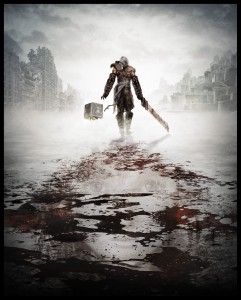An Interesting Game Draws NieR
I’m a little late to this post-apocalyptic party.
I’m not even really sure NieR can be called a game. While it has many elements of a game, so many of its parts are clearly parody – of Zelda, Resident Evil, text adventures, God of War, and even bullet-hell games – that I’m not sure there’s much left you can really call NieR at its core. Yet at the same time, it is a game with a highly serious plot. On the other hand, it has all sorts of nonsensical banter – your floating-book companion, Grimoire Weiss, makes fun of you incessantly for accepting the most inane quests from villagers. Kainé is also a wonderful vehicle for (more profane) banter.
It is the seriousness that overwhelms the banter, though – and you get the sense that the constant back-and-forth is the characters coping with what is going on. Still more important – not everyone knows what is going on. The main character (presumably named Nier) doesn’t have the full picture. You can only see it by going through a new game plus (less painful than you’d think – it can be done in about two hours). It is, of course, depressing.
You may think it difficult for a game to become more depressing when it opens in a snowy, abandoned city (in summer, no less) in which a man uses a rusty pipe to keep bizarre apparitions away from his diseased daughter. Somehow, it does, without the pathetic melodrama of Final Fantasy XIII – although you will probably have to play 20 hours to reach that point.
NieR is a mature game. Not in the sense of blood-and-guts (although it does have blood, you are fighting faceless apparitions), nor in the sense of nudity (although Kainé could use a little more clothing) – but rather that the plot is that well-written. The basic premise is pretty clear – a guy trying to find the cure to his daughter’s terminal illness – but there are much more detailed subplots, such as those of Kainé or Emil or Two Brothers Weaponry. And, of course, at the end of the game you get a ton of “reveals” that explain most everything – a quick new game plus explains everything else. The two additional endings after that are just icing on the cake.
As a bonus, NieR is not even that difficult. I died due to stupidity a couple of times, but if you figure out the strategy for getting the best weapons early (hint: more expensive weapons are better) you’re fine on Normal difficulty for the vast majority of the game. The gameplay is a little rough around the edges, but its annoyances can be safely ignored.
Speaking of ignored, if you play this game IGNORE ALL QUESTS not given you by the florist in the first 10 hours of the game. This will make your experience much less tedious. If you need money, once you have fields plant wheat with bounty fertilizer, then sell it when it’s ready to harvest (20-28 hours real-time, advance the system clock if you prefer). Farming is more enjoyable and faster than 90% of the quests and has better rewards.
What I gave it above may be a bit of a rave review – but far and away the best aspect of the game is its music. These are among my favorite tracks, but the vast majority of the soundtrack is fantastic (Chrono Cross quality).
Kainé/Escape (Youtube)
Hills of Radiant Winds (Youtube)
The Wretched Automatons (Youtube)
This interview is particularly fascinating, since it describes how the lyrics for the game were put together (The Wretched Automatons, for example, is intended to be futuristic English).
The soundtrack is even available on iTunes here. Square Enix is awesome for putting it up there, since otherwise I would have been forced to import the soundtrack to get my fix.
Finally, yes, the title is a reference to Dragon Quest IX which has had me addicted for the past two weeks. I don’t think I have ever enjoyed grinding so much.
